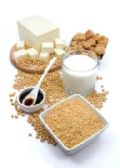|
If you're considering giving up meat, you probably already know about the potential benefits of a vegan or vegetarian lifestyle. According to the Physicians Committee for Responsible Medicine, meatless diets have been shown to reduce the risk of cancer, heart disease, diabetes, asthma, hypertension and other conditions. Many vegans and vegetarians have reported higher energy levels, increased weight loss and an improvement in overall well-being. But the decision to go meatless is just the first step along a path that will hold many concerns and considerations. The most important ingredient in a successful meat-free diet is knowledge. We talked to some vegan and vegetarian nutritionists to pinpoint what you need to know before making the transition. You don't have to go cold turkey.Many new vegans or vegetarians start out with an "all or nothing" mentality, and then return to meat after the shock of the change. You might have more success by easing into it. "You don’t have to give everything up all at once," says Lisa C. Andrews, a registered dietician at Sound Bites Nutrition. "Start with meatless Mondays, or just give up red meat and pork to start." Reed Mangels from The Vegetarian Resource Group points out that many people like to get a feel for a meatless lifestyle by eating vegetarian one day or one meal a week, and then gradually increasing the ratio. The key is choosing the approach that works best for your personality and lifestyle, and gauging how you feel along the way. Andrews also cautions that going vegan is a much more drastic lifestyle change than vegetarian, as a vegetarian diet still includes eggs and dairy. If you want to go vegan, you might consider starting with vegetarian and moving in steps toward your ultimate goal. Keep in mind that some of the foods you eat may already be vegan or vegetarian. "Many people already consume veggie meals without even really thinking about it," Andrews says. "For instance, pasta and a marinara sauce can be a really easy meal, especially when you add extra veggies to the sauce, like peppers and mushrooms. Additionally, there are many meat alternatives that can be added to the sauce." But while familiar meals are great, she stresses the importance of trying new foods. Variety is key.Contrary to some stereotypes, vegans and vegetarians don't live on kale and tofu. According to the Vegetarian Resource Group, the key to a well-rounded, satisfying meat-free diet is incorporating a wide variety of foods, including fruits, vegetables, leafy greens, whole grains, nuts, beans, lentils, seeds and legumes. As with any diet, it’s best to limit your intake of sweets and fatty foods. Vesanto Melina, a registered dietician for BecomingVegan.ca, recommends setting aside an evening each week for food prep. While listening to your favorite music or watching TV, you can put together hearty soups, entrees and a big salad that will last for a few days in your fridge. "People typically have about 10 favorite recipes or meals that they rely on, so when you switch to plant-based, you’ll want to find some that you really like," Melina says. "It can help to think of a whole new world of plant foods that you’ve never tried becoming available to you. You can get the same full range of flavors by preparing whole foods or by using veggie meats and cheeses, which have come a long way in recent years." For those busy weeknights when you haven't prepped and don't have time to cook, Mangels recommends keeping some quick-to-prepare veg foods on hand. Some ideas include canned beans, hummus, nut butters, quinoa, whole-wheat couscous, good whole-grains breads and crackers, veggie burgers, fruits and vegetables. "There has never been a better time than now when it comes to finding vegan alternatives at the supermarket," says Andrews. You may need to supplement.Depending on the type of meat-free eater you decide to be, there are several nutrients you may need to monitor and/or supplement. Nutrition expert Toby Amidor points out that vegans are most at risk of being deficient in certain nutrients, such as calcium, vitamin D, iron, protein and vitamin B12. In particular, B12 is an essential vitamin that maintains cellular health. Some side effects of deficiency include fatigue, difficulty reasoning, weakness, anemia and paranoia. Vegans need to include plenty of B12-fortified foods in their diet, and may also want to take a B12 supplement. Iron is of special concern for women entering into a vegetarian or vegan diet. Although vegan diets contain some iron, it's a different type that's not as easily absorbed by the body as animal-based iron, so you may need to supplement. Non-meat iron sources include leafy greens, sunflower seeds, dried raisins and legumes. Also, it's best to take a daily multi-vitamin to ensure that you meet the Recommended Dietary Allowance (RDA) for essential nutrients. There are plenty of non-meat protein sources.According to the Institute of Medicine, adults should consume a minimum of 0.8 grams of protein per day for every kilogram of body mass. For a 150-pound woman, that equals about 54 grams, or just under 2 ounces. As any healthy vegan or vegetarian can attest, meat isn't the only source of protein. Andrews recommends choosing unprocessed protein-packing foods, like beans, lentils, tofu, quinoa, natural soy, seitan, edamame or tempeh. Avoid eating too much processed non-meat foods, like vegetarian hot dogs and soy nuggets, as they tend to be higher in sodium and preservatives. Not everyone will be on board—and that's okay.Going meatless requires a lot of willpower and dedication, and it becomes even more challenging when the rest of your family and friends are meat eaters. Explain that this is an individual choice you are making for yourself, ask for their support and try to be non-judgmental of their choice to continue eating meat or animal foods. If your spouse is still eating meat, you can ask him or her to prepare it for the rest of the family. Another option is to make meals that can easily be customized for meat eaters. For example, you can stir fry some vegetables with rice, and then others can add their individual choices of meat. If people ask questions about why you're changing your diet, you can share your reasons—whether it's out of concern for your health, animal welfare, the environment or finances—or you can politely tell them it's none of their business. In lieu of explaining, you might also share a book or documentary that influenced you. "Become knowledgeable and confident in yourself so you're empathetic to others' feelings and beliefs, not challenging or defensive," Mangels recommends. "They may just want reassurance that you know what you're doing and that this is a healthy way to eat. Above all, it's important to be kind, sincere and concise." Some final advice from Andrews: "Keep in mind that changing one's eating habits from the 'norm' can result in others feeling challenged in their choices. It's important for both parties to have an open mind and learn the art of compromise. Take pride in going veg, lead by example and don't underestimate the power of a delicious vegan baked good when trying to win over friends and family." Quick Tips to Kick-Start a Meatless Diet
|






.jpg)
